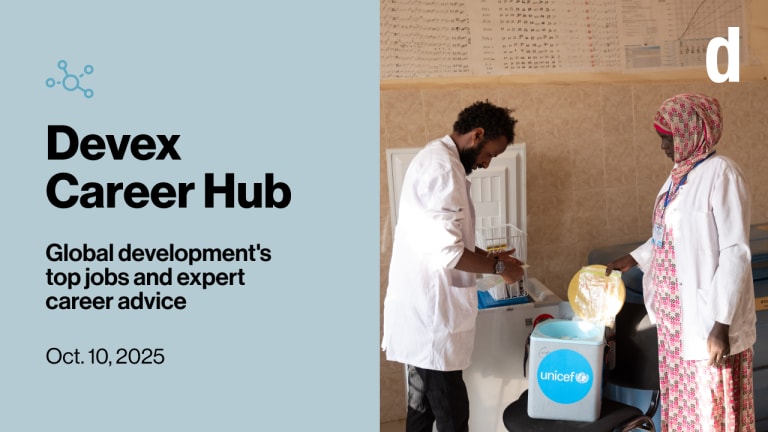Globaldev careers: The engineer
Peter Nzabanita of Engineers Without Borders USA says the greatest joy of working as an engineer in the global development space is seeing the impact of your work.
ALICANTE, Spain — While attention to detail, creativity, and maths skills might come to mind when thinking about the attributes of a good engineer, for Peter Nzabanita, senior program engineer with Engineers Without Borders USA, the most useful skills to have are networking and communication. Based in Uganda, Nzabanita splits his time between Kampala and trips into the field. He has been with the NGO — which focuses on education and the implementation of sustainable engineering projects — for just three months, but has over 10 years of engineering practice in the water, sanitation, and hygiene space. A civil engineer by training, he’s previously worked in both emergency and development contexts with the International Organization for Migration and World Vision. EWB helps communities build sustainable solutions for issues such as water supply, irrigation, energy, and bridges and roads, and offers opportunities for volunteers. Nzabanita oversees the implementation of projects around WASH. Aside from substantial knowledge about water supply design, implementation, and sustainability, Nzabanita said good communication can go a long way in helping to bridge the gap between community needs and decision-makers. “You're able to communicate on all angles to influence certain decisions and influence policies to your end,” he said. Speaking to Devex, Nzabanita explained what it can be like to work as an engineer in the global development space, the challenges he faces, and what advice he has for others looking to pursue a similar career. This conversation has been edited for length and clarity. What do you do as an engineer working in WASH? In my current role as a senior program engineer, I technically oversee and provide engineering support to the program in Uganda, which of course includes technical capacity that we provide to the government, NGOs, communities, and the United Nations system. I also provide technical engineering support [for WASH-related] infrastructure, providing input into the design. We also facilitate training for the trainees and volunteers who come to the country. What does your day as an engineer look like? On a typical day, I arrive in the office by 7.30am, check and respond to urgent emails, fit new activities into the plan ... From here, I attend meetings and coordinate our program activities including the provision of technical support. Sometimes I go into the field to ensure quality assurance of our work. “Make sure you stop looking at what you've just put in place and focus more on the impact that it creates because that is even more satisfying.” --— Peter Nzabanita, senior program engineer, Engineers Without Borders USA What would you say has been your career highlight? I've seen the impact on people's lives, in reducing the distance people travel to the water points. I have been part of the construction of over 20 water supply systems in the country and so many boreholes … I'm also proud to have initiated some work on fecal management in refugee settings in Uganda. And this is being taken up by quite a number of partners now in the humanitarian setting. What are some of the biggest challenges you face in your role? Sometimes you have a conflict at the strategic level ... People who actually are making decisions up there may not be in touch with what is happening [on the ground], so sometimes these two forces speak very different languages. The other thing is funding and resources. Sometimes you have analyzed the problem, you have resources to put down a structure that is supporting the beneficiaries, but in the end, you don’t have resources to ensure the sustainability of the intervention. And so somehow the dream that you had as an organization or as an individual at the strategic level, dies in the middle … It's very painful to install a borehole and two, three years down the road, it's not working and someone will come again and probably not pay up [to fix it], but sink another borehole, which involves a lot of other resources and has a long-term impact on the ground water. How do you overcome those challenges? My proposals have always been informed from the bottom up. Sometimes these proposals are approved by those at a strategic level who, again, have a bit of conflict. But on many occasions I've been able to share some of these challenges and some of these discussions — whenever I get an opportunity or with whoever I interact with. I believe that everyone has a role to play at whatever level they are at. Are there many opportunities to work as an engineer in the WASH space, or in the global development space more broadly? Yes, there are opportunities in WASH … and there is always a need in public health. What is required to utilize these opportunities is passion, creativity, and innovation. There are latrines, for example, but then there are always better ways of doing things. What advice would you have for other people that are looking to be an engineer in this space? It's a passion. Try to make sure you learn and do the research. Most importantly, try to look at where the problem is from the community level and seek their understanding and their views. What kind of person do you think is best suited to this kind of work? I think you have to be very open to learning and you have to be a bit selfless. [You have to] make sure you stop looking at what you've just put in place and focus more on the impact that it creates because that is even more satisfying … Look at the impact of your actions. Find the latest engineering jobs on Devex’s jobs board.
ALICANTE, Spain — While attention to detail, creativity, and maths skills might come to mind when thinking about the attributes of a good engineer, for Peter Nzabanita, senior program engineer with Engineers Without Borders USA, the most useful skills to have are networking and communication.
Based in Uganda, Nzabanita splits his time between Kampala and trips into the field. He has been with the NGO — which focuses on education and the implementation of sustainable engineering projects — for just three months, but has over 10 years of engineering practice in the water, sanitation, and hygiene space. A civil engineer by training, he’s previously worked in both emergency and development contexts with the International Organization for Migration and World Vision.
EWB helps communities build sustainable solutions for issues such as water supply, irrigation, energy, and bridges and roads, and offers opportunities for volunteers. Nzabanita oversees the implementation of projects around WASH.
This article is exclusively for Career Account members.
Unlock this article now with a 15-day free trial of a Devex Career Account. With a Career Account subscription you will get:
- Full access to our jobs board, including over 1,000 exclusive jobs
- Your Devex profile highlighted in recruiter search results
- Connections to recruiters and industry experts through online and live Devex events
Start my 15-day free trialAlready a user?
Printing articles to share with others is a breach of our terms and conditions and copyright policy. Please use the sharing options on the left side of the article. Devex Pro members may share up to 10 articles per month using the Pro share tool ( ).
Rebecca L. Root is a freelance reporter for Devex based in Bangkok. Previously senior associate & reporter, she produced news stories, video, and podcasts as well as partnership content. She has a background in finance, travel, and global development journalism and has written for a variety of publications while living and working in Bangkok, New York, London, and Barcelona.








